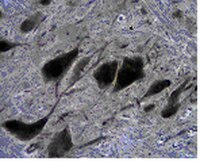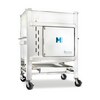Differential postpartum sensitivity to the anxiety-modulating effects of offspring contact is associated with innate anxiety and brainstem levels of dopamine beta-hydroxylase in female laboratory rats.
Ragan, CM; Lonstein, JS
Neuroscience
256
433-44
2014
显示摘要
In female mammals, the postpartum period involves dramatic shifts in many socioemotional behaviors. This includes a suppression of anxiety-related behaviors that requires recent physical contact with offspring. Factors contributing to differences among females in their susceptibility to the anxiety-modulating effect of offspring contact are unknown, but could include their innate anxiety and brain monoaminergic activity. Anxiety behavior was assessed in a large group of nulliparous female rats and the least-anxious and most-anxious tertiles were mated. Anxiety was assessed again postpartum after females were permitted or prevented from contacting their offspring 4 h before testing. Levels of dopamine β-hydroxylase (DBH, norepinephrine synthesizing enzyme) and tryptophan hydroxylase-2 (TPH2, serotonin synthesizing enzyme) were measured in the brainstem and dorsal raphe, respectively. It was found that anxiety-related behavior in the two groups did not differ when dams were permitted contact with offspring before testing. Removal of the offspring before testing, however, differentially affected anxiety based on dams' innate anxiety. Specifically, dams reverted back to their pre-mating levels of anxiety such that offspring removal slightly increased anxiety in the most-anxious females but greatly lowered anxiety in the least-anxious females. This reduction in anxiety in the least-anxious females after litter removal was associated with lower brainstem DBH. There was no relationship between females' anxiety and dorsal raphe TPH2. Thus, a primary effect of recent contact with offspring on anxiety-related behavior in postpartum rats is to shift females away from their innate anxiety to a more moderate level of responding. This effect is particularly true for females with the lowest anxiety, may be mediated by central noradrenergic systems, and has implications for their ability to attend to their offspring. | Western Blotting | 24161285
 |
Mammalian-specific sequences in pou3f2 contribute to maternal behavior.
Nasu, M; Yada, S; Igarashi, A; Sutoo, D; Akiyama, K; Ito, M; Yoshida, N; Ueda, S
Genome biology and evolution
6
1145-56
2014
显示摘要
Various mutations have occurred during evolution among orthologs, genes in different species that diverged from a common ancestral gene by speciation. Here, we report the remarkable deterioration of a characteristic mammalian maternal behavior, pup retrieval, in nonmammalized mice, in which the transcription factor Pou3f2 was replaced with the Xenopus ortholog lacking all of the homopolymeric amino acid repeats of mammalian POU3F2. Most of the pups born to the nonmammalized mice died within days after birth, depending on the dam genotype alone. Quantitative immunohistochemical analysis revealed decreases in the rate-limiting enzymes of dopamine and serotonin synthesis in various brain structures. Similar results were obtained in knock-in mice in which all of the homopolymeric amino acid repeats of mammalian POU3F2 were removed. Pup retrieval behavior in mammals is thus strongly related to monoamine neurotransmitter levels via the acquisition of homopolymeric amino acid repeats during mammalian evolution. | | 24709564
 |













